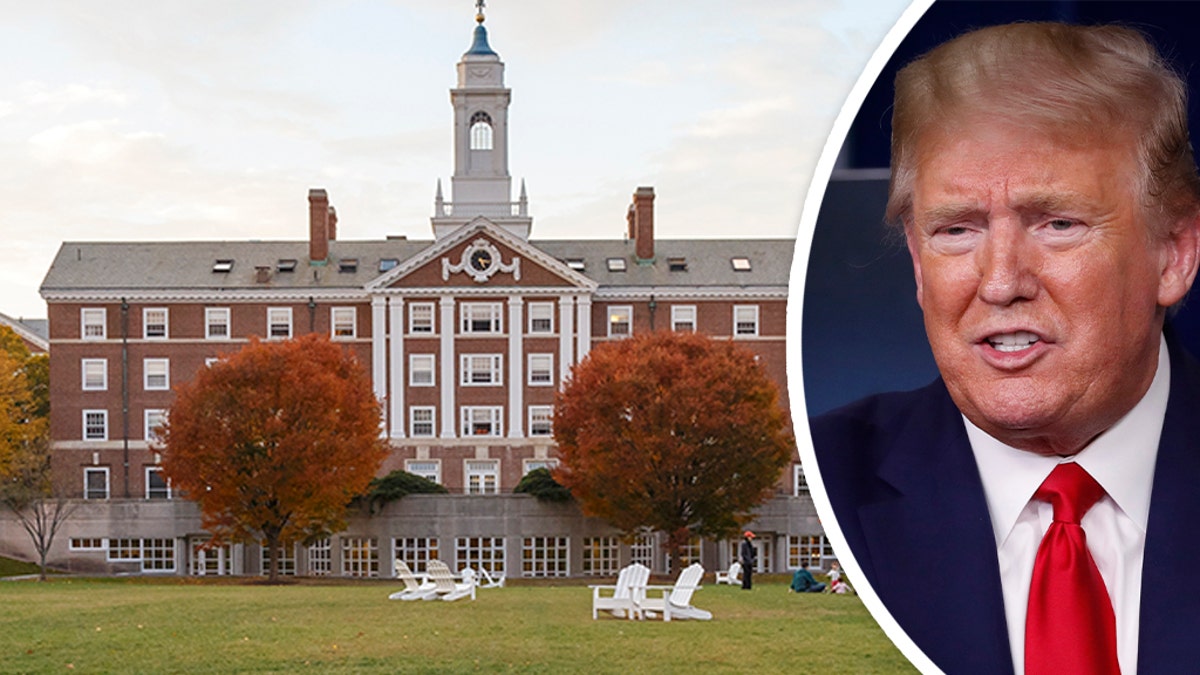Harvard Grant Money At Risk: Trump's Plan To Shift Funds To Trade Schools

Table of Contents
The Proposed Funding Shift: Details and Rationale
The Trump administration's plan aimed to reallocate a significant portion of federal grant money away from universities, including those with substantial endowments like Harvard, and towards vocational and trade schools. While precise figures varied depending on the specific budget proposals, the core idea involved decreasing funding streams traditionally supporting research and undergraduate aid at established universities. The stated rationale centered on addressing the "skills gap" – a perceived shortage of skilled workers in specific sectors. This initiative aimed to boost workforce development and fuel economic growth by investing directly in programs preparing individuals for in-demand trades.
- Funding Cuts Proposed for Universities: Reductions were proposed across various federal grant programs supporting research, student financial aid (like Pell Grants), and institutional operating budgets. Specific examples included cuts to the National Institutes of Health (NIH) and National Science Foundation (NSF) budgets.
- Funding Increases Proposed for Trade Schools: Increased funding was proposed for vocational training programs and community colleges offering technical certifications and apprenticeships. This included targeted grants for programs focused on high-demand fields such as manufacturing, technology, and healthcare.
- Official Justifications: Statements from the administration emphasized the need to align higher education spending with the demands of the modern workforce, arguing that investing in trade schools would better prepare students for immediate employment and contribute directly to economic growth. These claims often highlighted the rising costs of college tuition and the perceived lack of relevance of some university degrees in the job market.
Impact on Elite Universities like Harvard
The proposed funding shift carries significant implications for elite universities like Harvard. Reduced federal grants could lead to several adverse effects:
-
Reduced Research Funding: Harvard's extensive research programs, which rely heavily on federal grants, could face substantial cuts. This could jeopardize groundbreaking discoveries and innovations across diverse fields, from medicine to engineering.
-
Increased Tuition: To compensate for the loss of federal funding, Harvard might be forced to increase tuition fees, potentially limiting access for students from lower-income backgrounds.
-
Fewer Financial Aid Opportunities: Cuts in federal aid could reduce the university's capacity to provide need-based financial assistance, making a Harvard education even less attainable for many students.
-
Specific Programs at Risk: Departments heavily reliant on federal grants, such as those in the sciences and engineering, could be disproportionately affected. Research projects requiring expensive equipment and extensive fieldwork would be particularly vulnerable.
-
Impact on Student Enrollment and Diversity: Higher tuition and reduced financial aid could result in decreased enrollment from students of diverse socioeconomic backgrounds, compromising the university's commitment to inclusivity.
-
Impact on Reputation: While Harvard's substantial endowment provides some buffer, significant cuts could still impact its global prestige and standing as a leading research institution.
The Broader Implications for Higher Education
The proposed funding shift carries significant implications for the entire US higher education system. The potential consequences extend beyond the impact on individual universities and into the realm of national economic and social policy:
-
Shift in Institutional Balance: A dramatic increase in funding for trade schools could reshape the balance of power within higher education, potentially diverting attention and resources away from traditional four-year institutions.
-
Changes in Student Enrollment: Students might be encouraged to pursue vocational training instead of university degrees, leading to a shift in enrollment patterns and altering the skills composition of the workforce.
-
Impact on American Competitiveness: Decreased investment in basic research at universities could harm the nation's long-term competitiveness in science, technology, and other critical fields.
-
Unintended Consequences for Workforce Development: Focusing solely on short-term skills training might neglect the need for critical thinking and problem-solving abilities, ultimately hindering long-term economic growth.
-
Impact on STEM Fields: Funding cuts could negatively impact STEM (Science, Technology, Engineering, and Mathematics) fields, hindering progress in innovation and technological advancements.
-
Impact on Humanities and Liberal Arts: These disciplines, which often rely on federal grants and university endowments, could suffer significant setbacks.
Counterarguments and Alternative Perspectives
The proposed funding shift has drawn considerable criticism. Many argue that it prioritizes short-term solutions at the expense of long-term investments in research and higher education:
- Arguments Against the Shift: Critics highlight concerns about equity and access, asserting that reducing funding for universities disproportionately impacts low-income students. They argue that a well-rounded education, encompassing both vocational and academic skills, is essential for economic mobility and societal progress.
- Alternative Proposals: Instead of diverting funds, critics suggest investing in expanding access to affordable vocational training programs without diminishing support for existing higher education institutions. This could include initiatives like increasing Pell Grant funding, expanding apprenticeship programs, and creating targeted grants for skill-building programs within universities.
- Arguments from Stakeholders: University administrators and faculty expressed concerns about the potential damage to research and the overall quality of higher education. Student advocacy groups voiced concerns about the impact on student financial aid and access to higher education.
Conclusion: The Future of Harvard Grant Money and Higher Education
The Trump administration's plan to shift federal grant money from universities like Harvard towards trade schools presents a complex challenge with far-reaching consequences. While addressing the skills gap is crucial, a drastic reduction in funding for research and higher education could inadvertently harm the nation's long-term economic competitiveness and social mobility. The potential loss of Harvard grant money exemplifies the broader risks facing the entire higher education landscape. The debate surrounding this policy highlights the need for a balanced approach that supports both workforce development and investment in crucial research initiatives within universities. Stay informed about the debate surrounding Harvard funding and the future of higher education. Voice your opinion to your representatives and advocate for policies that support both research and workforce development. The future of Harvard grant money and the broader higher education system hinges on thoughtful consideration of the long-term implications of such policy shifts.

Featured Posts
-
 Direct Tribal Loans Guaranteed Approval For Bad Credit Borrowers
May 28, 2025
Direct Tribal Loans Guaranteed Approval For Bad Credit Borrowers
May 28, 2025 -
 Semarang Hujan Pukul 1 Siang Prakiraan Cuaca Besok 26 Maret Di Jawa Tengah
May 28, 2025
Semarang Hujan Pukul 1 Siang Prakiraan Cuaca Besok 26 Maret Di Jawa Tengah
May 28, 2025 -
 Welcome To Wrexham Your Guide To The Best Attractions And Activities
May 28, 2025
Welcome To Wrexham Your Guide To The Best Attractions And Activities
May 28, 2025 -
 Bali Belly Recognizing Symptoms And Seeking Appropriate Treatment
May 28, 2025
Bali Belly Recognizing Symptoms And Seeking Appropriate Treatment
May 28, 2025 -
 I Ekthesi Toy Goyes Anterson Sto Londino Kinimatografikos Kosmos Se Pliri Ektasi
May 28, 2025
I Ekthesi Toy Goyes Anterson Sto Londino Kinimatografikos Kosmos Se Pliri Ektasi
May 28, 2025
Latest Posts
-
 Lone Wolf Movie Production Complete For Pellingtons Conspiracy Thriller
May 29, 2025
Lone Wolf Movie Production Complete For Pellingtons Conspiracy Thriller
May 29, 2025 -
 Lone Wolf Pellingtons Conspiracy Thriller Wraps Filming With Gladstone And Cranston
May 29, 2025
Lone Wolf Pellingtons Conspiracy Thriller Wraps Filming With Gladstone And Cranston
May 29, 2025 -
 Did Bryan Cranstons How I Met Your Mother Joke About Pete Rose Come True
May 29, 2025
Did Bryan Cranstons How I Met Your Mother Joke About Pete Rose Come True
May 29, 2025 -
 The Bryan Cranston Pete Rose Joke A 20 Year Old How I Met Your Mother Prediction
May 29, 2025
The Bryan Cranston Pete Rose Joke A 20 Year Old How I Met Your Mother Prediction
May 29, 2025 -
 Bryan Cranstons How I Met Your Mother Pete Rose Joke A 20 Year Prophecy
May 29, 2025
Bryan Cranstons How I Met Your Mother Pete Rose Joke A 20 Year Prophecy
May 29, 2025
